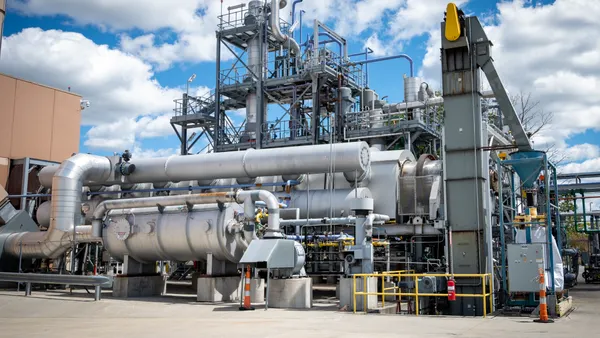Dive Brief:
- The Canadian city of Vancouver is looking for new ways to reduce the amount of single-use or to-go items getting thrown out on a regular basis, as reported by CBC News. The city estimates that 2.6 million polycoat paper cups and 2 million plastic bags are disposed each week.
- Officials are looking at a wide range of options, as reported by The Globe and Mail. This could entail regulations that prohibit or encourage the reduction of certain single-use packaging at commercial establishments. Non-regulatory approaches are also being considered, such as education programs, voluntary fees or container exchange programs.
- Vancouver is seeking public comment on a consultation paper through Dec. 15 and is also taking the project directly to citizens with a "pop-up engagement space" that will be open through Dec. 5. The centerpiece is an oversized plastic bag brimming with about 1,300 cups — the average amount thrown away every five minutes.
Drop by our pop-up engagement space at 511 W Broadway to share your thoughts and ideas as we continue to develop our Single-Use Item Reduction Strategy. For more info go to: https://t.co/l6wXo3rHCf pic.twitter.com/SwhMBM5b0T
— City of Vancouver (@CityofVancouver) November 26, 2017
Dive Insight:
Vancouver has set a goal of achieving "zero waste" by 2040 as part of a broader "Greenest City Action Plan." In the near-term, the city is aiming to reduce waste 50% by 2020. The latest annual progress report showed a 27% decrease in waste since 2008. Because single-use and take-out items comprise about 22% of the material in public bins, and cost $2.5 million per year to collect or pick up as litter, Vancouver has begun increasing its focus on ways to minimize them.
As part of its larger waste reduction targets, Vancouver aims to also cut cup and container waste by 50% and bag distribution by 70%, within the next five years. The city has received attention for new "zero waste" shopping options, but it's still more convenient and accessible for the majority of residents to participate in the current system.
Though the city's report notes that the Vancouver City Council has "considerable legislative authority" to enact new policies, it also emphasizes an openness to other options. Affordability, practicality and encouragement of circular economy principles are also listed as key factors.
While it wouldn't be a surprise to see another local government in Canada enact more extensive recycling regulations, Vancouver is also aware of the various pitfalls that can arise. As seen in the U.S., packaging industry interests can be expected to push back, consumers can be expected to resist change and critics of all kinds can be expected to highlight the flaws or unintended consequences of any new rules.
Engaging the public in a creative way can involve them in the conversation earlier and try to achieve consensus on what makes the most sense for their city.










